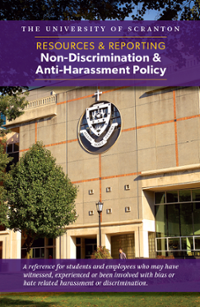Non-Discrimination & Anti-Harassment
Non-Discrimination Statement
The University is committed to providing an educational, residential, and working environment that is free from harassment and discrimination. Members of the University community, applicants for employment or admissions, guests and visitors have the right to be free from harassment or discrimination based on race, color, creed, religion, ancestry, gender, sex, pregnancy and related conditions, sexual orientation, gender identity or expression, sex characteristics, sex stereotypes, age, disability, genetic information, national origin, ethnicity, family responsibilities, marital status, veteran or military status, citizenship status, or any other status protected by applicable law.
Sexual harassment, including sexual violence, is a form of sex discrimination prohibited by Title IX of the Education Amendments of 1972. The University prohibits discrimination on the basis of sex in its educational, extracurricular, athletic, or other programs or in the context of employment.
The University will promptly address reports of discrimination under the University Non-Discrimination and Anti-Harassment Policy or the Sexual Harassment and Sexual Misconduct Policy, Anyone who has questions about the above referenced policies , or wishes to report a possible violation of one of the policies should contact:
Elizabeth M. Garcia
Title IX Coordinator
Office of Institutional Compliance and Title IX
800 Linden St., Scranton, PA 18510
Institute of Molecular Biology & Medicine, Suite 315
elizabeth.garcia2@scranton.edu
(570) 941-6645
scranton.edu/compliance-titleix
University Non-Discrimination and Anti-Harassment Policy
The University believes that the rights and dignity of all people must be protected, and that laws articulating these rights must be upheld. To help fulfill this commitment, one rooted in our Catholic and Jesuit academic tradition, the University is dedicated to providing a diverse, inclusive educational, residential, and working environment that is free of harassment, including sexual harassment, and discrimination.
Filing a Complaint
Elizabeth M. Garcia, Associate Vice President, Office of Institutional Compliance and Title IX, is responsible for oversight and implementation of the University’s Non-Discrimination and Anti-Harassment Policy.
- Incident Reporting Form: https://scranton.i-sight.com/external-capture
- Note: Reporting individuals may use this link to file reports anonymously. Reports made here are received by the Office of Institutional Compliance and Title IX. All anonymous reports will be reviewed and processed per the University's policy; however, anonymous reports may hamper the University’s ability to fully respond.
|
In the tradition of our Jesuit institution that strives for excellence, The University of Scranton is dedicated to providing a diverse and inclusive, learning, living, and working environment that is free of harassment and discrimination, and is committed to protecting the rights and dignity of all members of the University community and its guests. Resources and support for persons who may have experienced an incident(s) of harassment/discrimination may be found in the Resources and Reporting Non-Discrimination and Anti-Harassment Brochure. |
 |





